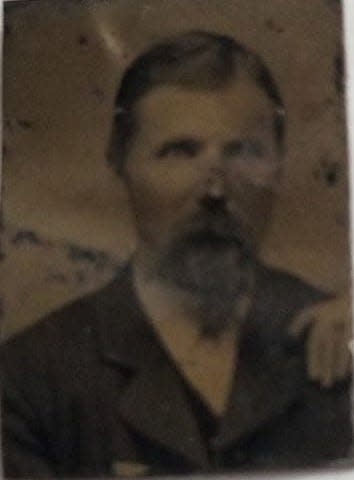Veterans Column: A glimpse into the Civil War journal of Charles A. Cook
- Oops!Something went wrong.Please try again later.
- Oops!Something went wrong.Please try again later.
- Oops!Something went wrong.Please try again later.

Charles A. Cook who was serving with Company G of the 1st Veteran Volunteer Engineers continued his diary entries in April of 1865. On April 3, 1865, the Confederate capitol of Richmond, Virginia was captured by the Union Army.
The news seemed to travel quickly because Cook recorded in his diary on April 3, “There is a rumor in camp that Richmond, VA. is captured, it is not credited by me.” On April 4, he adds, “Official report of the capture of Richmond and Petersburg received, great rejoicing everywhere.” On April 5, he added; “20,000 prisoners reported captured in Virginia. Lee retreating.” On April 7, Cook who had fought at the Battle of Shiloh with the 76th OVI recorded, “Three years ago today we drove the rebs from Shiloh.”
During the rest of the month of April, Cook recorded the news as they received it in Tennessee chronicling the end of the Civil War and the assassination of President Lincoln. On Monday, April 10, Cook writes, “This P.M. we heard today that Lee surrendered.” The next day he added, “The news are that Lee has surrendered himself and army, it is generally believed to be true.” April 13, “the news is good [General Phillip] Roddy and [General Nathan Bedford] Forrest surrendered their forces.” On April 14, Major General Robert Anderson who four years to the day in 1861, had been forced to lower the flag and surrender Fort Sumter to the south, raised the flag of the United States again over the fort. Cook recorded the event on the same day, “General Anderson raises the flag over Fort Sumter. Salutes fired and general rejoicing everywhere.”
But everyone wasn’t rejoicing that day over the Union victory. That evening in Washington, John Wilkes Booth and conspirators attacked Secretary of State William Seward and President Abraham Lincoln. Seward survived his attack but Lincoln didn’t. On April 15 Cook noted, “Heard the bad news that Pres. Lincoln and Wm. Seward had been murdered, Very sad if true. On April 17 the news was confirmed on Lincoln, “Weather good we worked till 10 a.m. when we were ordered to quarters on account of the day being observed for the death of our loved president, Abraham Lincoln.” The next day he records, “Weather good, I helped score timber today news of the surrender of the Rebel [General Joseph] Johnston and army, also the surrender of Mobile to our forces.” On April 26, John Wilkes Booth was found and shot by Union Soldiers, On April 28 Cook writes, “Heard the welcome news that Booth the assassin had been shot–good.” Cook was discharged on Sept. 26, 1865, and returned home to Linville Ohio. He continued to add to his diary throughout 1865 and even added some later notes in the back. The complete diary can be read by searching “Cook, Charles A” at the Licking County Library’s online veteran database, “In the Company of Heroes” at http://lclibrary.pastperfectonline.com.
On July 2, 1881, President James Garfield was mortally wounded by an assassin. For weeks after the shooting, Garfield’s doctors tried to save the president. But because of the shooting Charles Cook’s life would change forever as he delivered a punch heard around the world.
Doug Stout is a guest columnist for the Newark Advocate.
This article originally appeared on Newark Advocate: Veterans Column: A glimpse into the journal of Charles A. Cook
